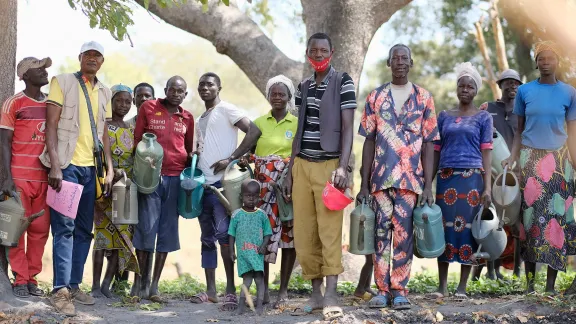
Danamadja village in Chad, where LWF supports returnees and their hosts with agricultural tools and professional formation. Photo: LWF/ M. Renaux
LWF Country Programs highlight contributions of host communities
(LWI) - Local communities are the leading actors in welcoming and supporting refugees. On World Refugee Day, the Lutheran World Federation highlights its work with refugee and host communities and calls for more support for emergencies outside the public eye.
"Thousands of people, including Sudanese refugees and Chadian, have fled and found refuge in East of Chad provinces experiencing lack of food, water, safety, protection, health care, and education," says Ngolsou Keting, LWF Country Representative in Chad. His team for a year has been on the frontline of the Sudan emergency response in the country, providing core relief items and protection services and facing insecurity, overwhelming needs, and underfunding.
"Despite the assistance from the government and humanitarian agencies and organizations, the needs remain huge while the funding is decreasing continuously," he says. The Sudan response in Chad is only funded by 13 percent, he adds.
Basic needs not met
LWF staff in country programs around the world echo the sentiment. "All too often, refugee crises fade from the headlines, and urgent needs go unmet. We cannot allow these emergencies to be forgotten or ignored," says Ameera Khamees, LWF Country Director in Jordan. The country hosts over 650,000 Syrian refugees, 130,000 refugees from Iraq, and 2 million Palestinian refugees.
Often, local communities are the first to respond to emergencies and the ones who provide the most assistance. "The host communities in Jordan have opened their homes, shared limited resources, and embraced those fleeing violence and persecution. Yet they cannot bear this responsibility alone," Khamees emphasizes.
Open-door policy
LWF Country programs worldwide commemorate World Refugee Day, often through joint celebrations with the host communities. Many use this day also to celebrate the skills and talents that refugees bring to their new homes.
LWF in Uganda will host the finale of "Refugees Got Talent," a talent show that showcases music, dance, and other creative talents of refugees living in the Rwamwanja refugee settlement in the west of the country. "On World Refugee Day, we commemorate that people flee their homes to find safety and refuge," says Adriana Franco Chitanana, LWF Country Representative in Uganda.
The host communities in Jordan have opened their homes, shared limited resources, and embraced those fleeing violence and persecution. Yet they cannot bear this responsibility alone.
Ameera KHAMEES, LWF Jordan Country Director
Uganda hosts 1.6 million refugees, among others, from the conflicts in South Sudan, the Democratic Republic of Congo, and most recently, Sudan. It has hosted the most significant number of refugees in Africa. It has an exemplary open-door policy, giving refugees a status upon arrival and a piece of land to farm.
"Here in Uganda, we also celebrate the fact that this country provides refuge for so many different persons and nationalities," Chitanana adds. "It's a moment to recognize all the hard work put in by the communities and the government".
120 million displaced
According to the United Nations High Commissioner for Refugees (UNHCR), one hundred twenty million people worldwide had to leave their homes. Many of them are people displaced inside their home countries, so-called internally displaced people (IDPs). More than half of them are women and children.
LWF World Service, with the support of LWF member churches and partners, provides humanitarian and development aid in 25 countries in Africa, Asia, Latin America, the Middle East, and Europe. In 2023, they served 2.6 million people in need.
"Refugees want nothing more than the opportunity to regain their dignity and self-reliance. By neglecting their plight, we fail the refugees and the gracious host countries who have stepped up when the world has not". LWF Jordan Country Director Khamees concludes.


